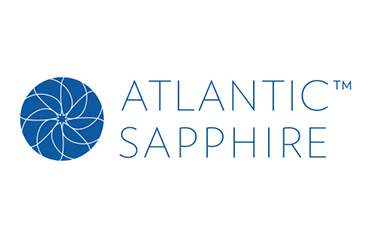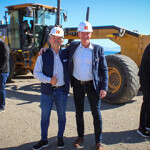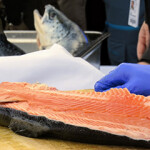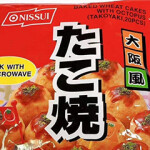The Top 25: Atlantic Sapphire Q&A

Atlantic Sapphire is featured in The Top 25: Sustainability & Conservation list, published by SeafoodSource on 24 September, 2020.
SeafoodSource: What kind of trends have informed Atlantic Sapphire’s latest sustainability/conservation efforts?
Atlantic Sapphire: Atlantic Sapphire exists on the concept of sustainability. By farming salmon in our Bluehouses, we eliminate most of the environmental challenges faced traditionally by the salmon industry, such as unmanaged waste depositing on the seabed and affecting ocean ecosystems; salmon diseases; use of antibiotics; salmon escapes, which have a negative effect on ocean biodiversity and especially on wild populations of salmon; management of predators; and microplastics.
By producing in single locations near end-markets, we’re also collapsing airfreight-related greenhouse gas emissions.
Another aspect of our sustainability model is our approach to circular economy as we continue to explore opportunities for the reutilization of waste materials that are valuable for the production of other products.
In addition, supply chain robustness and traceability – which fully align with our commitment to stakeholders through product safety – engagement, and transparency are key aspects of our business and sustainability model.
In summary, animal welfare, environmental footprint, transparency, traceability, product safety, and commitment to stakeholders shape our sustainability efforts day-by-day.
To implement this, we bring research and innovation into every decision and combine it with the creation of a robust company-wide culture around these aspects: healthy environment, engaged employees, financial performance, and sustainable supply chain, with a central focus on the health of our fish.
SeafoodSource: What key features serve to set Atlantic Sapphire’s sustainable seafood offerings apart in the market?
Atlantic Sapphire: Growing a brand on the promise of sustainability does not happen by accident. Consumer trust in Atlantic Sapphire’s product is vital to our business and position as a leader in the marketplace. For that reason, we are mindful to ensure the accuracy of every sustainability claim we make on the product labelling and in our marketing.
Our salmon is raised in systems that provide ideal conditions for growth and well-being, it is ocean-safe, planet-friendly, free of antibiotics, heart-healthy, and fresh, never-frozen sushi-grade salmon. These attributes are only possible thanks to our Bluehouse in-market production, which ensures unmatched freshness in the marketplace and longer shelf-life.
The growing demand for healthy and sustainably produced proteins and seafood, which has been supported by market research commissioned by third-party experts, means that retailers of every category are looking to promote sustainable food products. Although we produce premium salmon, our product fits with a broad category offering: in some retailers, Bluehouse salmon will be the only salmon sold, in others, it will be available alongside other products as a sustainable offering.
Atlantic Sapphire products are carried by a broad range of retailers in North America and Europe, from small- to large-scale. The sustainable attributes of our production system are verified and rated Green, or “Best Choice,” by the Monterey Bay Aquarium’s Seafood Watch program. Our Bluehouse salmon is also recommended by Ocean Wise.
SeafoodSource: How does sustainability factor into your overall mission and strategy as a business?
Atlantic Sapphire: Sustainability is intrinsic to our overall mission, it’s in everything we do and, as we grow, we’re working on both internal and external engagement and education programs to build culture and the necessary awareness around all aspects of sustainability: Environmental, social, and governance.
Atlantic Sapphire was founded by Johan Andreassen, Bjørn-Vegard Løvik, and Thue Holm, salmon entrepreneurs who envisioned a more sustainable way to farm salmon than traditional net-pen farming. Andreassen and Løvik had previously founded and operated the first organic salmon farming operation in the world with the novel use of cleaner fish as an alternative to pharmaceutical treatments to battle sea lice. They saw the need of reducing the impact of farming on the ocean and the air transportation of salmon across the world to increase sustainability in the industry. With this, and Holm’s expertise in recirculating aquaculture systems (RAS), they developed the Bluehouse concept, and they were able to bring the necessary experience and innovation to build Atlantic Sapphire on the pillars of sustainability.
SeafoodSource: How does Atlantic Sapphire approach sustainable, responsible development?
Atlantic Sapphire: Providing an environmental and social solution is central to Atlantic Sapphire. ESG factors are fully incorporated into our culture and serve as guidance principles to our daily actions. The team is measured on and recognized for its contributions to meeting company values on product, economic, environmental and social responsibility. As part of our commitment, we strongly support the U.N. Sustainable Development Goals. We have selected eight of the 14 SDG as priority targets based on the areas in which we’re best placed to drive change. We are also members of the U.N. Global Compact, the world’s largest voluntary corporate sustainability initiative, and we commit to its 10 principles on human rights, labor, environment, and anti-corruption.
Our framework for responsible governance includes our Environmental and Social Management System, which comprises a set of policies, procedures, and requirements to identify and manage our ESG impact.
In 2019, we published our first ESG report aligned with the Global Reporting Initiative (GRI) to ensure that our performance is presented in a complete, consistent and comparable manner going forward.







Share